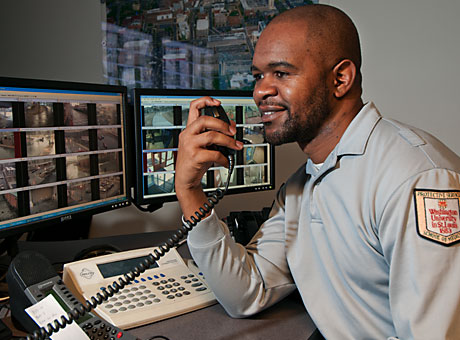
In his own words
Paul Banda

Paul Banda, a Protective Services communications officer at the School of Medicine, speaks candidly about the ordeal that brought him to the United States, St. Louis and eventually Washington University.
What was your life like in Zambia growing up?
Zambia is one of the poorest countries in Africa, and I lived on the outskirts of Lusaka, its capital city, in a very poor community. Many children there end up on the streets, and maybe one in eight get to attend school. I come from a family of nine kids — one girl and eight boys. My dad died in 1994, and raising so many children in that environment was really tough for my mom.
When did your life change?
My friends and I would come together at the church and start singing. A missionary from Texas heard us and said that he was there to help us get an education. The way he was going to do that was to get us to come to the United States and sing in a boys’ choir that would tour the country to raise funds for an education project back home.
Were you excited about that opportunity?
Yes! He had promised stipends for our families; it was just like a dream come true. He also promised that we would get an education when we came back to Zambia.
When did you realize that the opportunity was not as good as it seemed?
We came to the United States in 1998 and began touring. Since our culture and our singing is very different, people loved us. But things weren’t right; I think the missionary saw an opportunity in how much money he could make, and then things just turned from what was an exciting venture into horror.
How so?
One time I broke my ankle and my leg was swollen and I was in pain. He wanted me to go ahead and perform because people would feel more remorse and they would give more money. The rule was: “If you can’t sing, you can’t eat.” He told us that we couldn’t do anything in America — that if anything happened, we were the ones who would end up homeless on the streets. But the worst part was the isolation; we were totally cut off from other people.
How long did this go on?
About four years. When it got really bad, some of the older guys, including myself, escaped at night by running through the woods to a nearby town and contacting the police.
What happened after your escape?
We found out that the U.S. government had already started investigating this man for human trafficking. Agents from the Immigration and Naturalization Service rescued the rest of the boys: The younger boys were placed with host families from local churches and several of the older boys, including myself, ended up in St. Louis, where we pretty much had to fend for ourselves. We couldn’t go home, because we were part of a human trafficking case, but we also weren’t authorized to work. We were in limbo for a long time.
How did all of this affect your family in Zambia?
Well… my mom had died and I didn’t know. It’s something that … the pain that I had to go through … to find out that my mom was dead, it was very bad. And my younger brothers back home were orphans and they looked up to me. I wanted to do the right thing because in my family I’m the fifth-born and my older brothers and sister had all passed away before they reached the age of 26 due to poor diet, poverty and disease.
Did you ever just want to give up?
So many times. But I used to think about my brothers a lot. I also thought that if I give up, I let that guy win, the one who brought us over here.
He died before he could be prosecuted. Did you feel like you and the other boys didn’t receive justice?
Even now I feel like that, but I told myself I’m not going to dwell on that, I’m going to do the best for myself.
How has Washington University helped you achieve that goal?
My professional, academic and personal growth really began at the School of Medicine. I had a good relationship with the students when I worked at Olin Hall; I also discovered a talent for art. Now I’m working with an amazing group of guys in Protective Services. Everyone here has been so supportive.
Do you miss Zambia?
This is what I say. I miss Zambia, but I love being here because of the second chance in life that I have. My younger brothers now have a chance to improve their life expectancies because I am able to provide money for food and medication. Being here has given not only me, but everybody else back home, a second chance.






